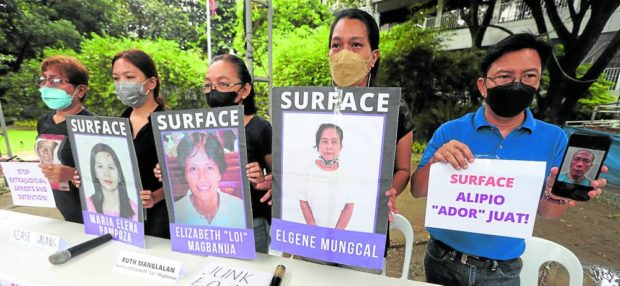
Relatives of four missing community workers, accompanied by representatives from various nongovernment organizations, filed a complaint at the Commission on Human Rights on Wednesday, July 13, 2022. (INQUIRER PHOTO)
MANILA, Philippines — Alipio “Ador” Juat is no stranger to political repression.
A longtime unionist and community organizer for the labor center Kilusang Mayo Uno (KMU), Juat was one of the scores of activists who survived arrest and torture during the martial law regime of President Ferdinand Marcos Jr.’s late father.
Since that period, labor and peasant organizers and political activists were considered destabilizers, KMU secretary general Jerome Adonis told reporters on Wednesday.
“But it is not a crime nor will it ever be a crime to organize communities,” Adonis said.
On May 3 — just days before the presidential elections that was won by the dictator’s son and namesake — history repeated itself for Juat. He and fellow community organizer Elizabeth Magbanua were abducted by armed men who said they were from the Philippine Navy, according to Adonis.
He said the martial law survivor “has now been victimized twice over by a Marcos.”
Juat and Magbanua and two peasant organizers, Elgene Mungcal and Elena Cortez, had gone missing in a string of disappearances in Central Luzon.
Their families have called on the Marcos administration to help find their loved ones and stop the wanton arrests and enforced disappearances of dissidents.
Asking AFP
On Wednesday, they filed a formal complaint before the Commission on Human Rights (CHR) and asked the state rights watchdog to help them investigate the cases.
The CHR said it would send a representative to Camp Aguinaldo, the Armed Forces headquarters in Quezon City, as soon as possible.
Juat supposedly was able to send word to his family that he was taken there by the men who had seized him.
The families of the missing are demanding that the authorities allow them to return home “without condition and immediately.”
They also want the new administration to junk Executive Order No. 70, which created the National Task Force to End Local Communist Armed Conflict (NTF-Elcac) that was created by Marcos’ predecessor, Rodrigo Duterte.
Last call to family
The anti-communist task force has become notorious for Red-tagging critics of the government, many of whom were later persecuted, prosecuted or killed.
Representatives of the women’s group, Gabriela, and KMU accompanied the relatives of Juat and the three others to the CHR.
Magbanua, a longtime member of KMU, has been missing since May 3. Gabriela members Mungcal and Cortez disappeared on July 3.
Juat was able to make a call to his family recently, telling them he was being held in Camp Aguinaldo
Adonis believes that no one else “would have an interest in our four colleagues except the government and the military who wish to silence those who fight for true justice.”
Apparently, Magbanua and Juat were together in Valenzuela City on May 3 to attend a meeting related to their community organizing work, according to Ruth Maglalan, Magbanua’s partner.
In his brief phone call, Juat told his family that the police were waiting for him and Magbanua at the gate of the subdivision where they were to hold their meeting. After they were seized, they were whisked away in separate vehicles.
Juat demanded to know where Magbanua was taken but the men just told him not to fret about his colleague, his relatives said.
Juat said he was brought to Camp Aguinaldo without being told what charges he was being detained for. He has not been heard from since making that call.
‘No right to take her’
Maglalan tearfully told reporters that Magbanua had been a community organizer for the past three decades and “has done nothing but help people realize their rights.”
“There is no just reason for them to take her away from us, from me, from everyone who loves her,” she said. “They have no right to take her away from the masses that she has served her entire life.”
She challenged President Marcos to “prove that he is not like his father” in the way that the ousted dictator let human rights abuses “run rampant” under his martial law regime, and to show that he was different, he should order the military to surface Magbanua and all other victims of enforced disappearances.
Cortez’s daughter, Azaze Galang, was distraught over the disappearance of her mother years after her father, also a peasant organizer, went missing.
She asked the military “to open the camps and let us look for our loved ones freely.”
Worst fears
The last time she saw her mother was when she was heading to a meeting with Mungcal in Moncada town, Tarlac province. A closed circuit television footage at Moncada’s Winfare Supermarket was the last image of her mother that she saw on July 3.
Cortez has not returned home since then.
There were no members of Mungcal’s family that met with the reporters and the CHR staff on Wednesday.
Galang fears that both her parents are victims of enforced disappearances, never to be heard from again.
“This has happened to us once before. I hope that what had happened in the past would not continue to happen today, that we would get no word about our parents,” Galang said.
Joms Salvador, Gabriela secretary general, said her group has been documenting many cases of enforced disappearances across the country over a short span of time.
“We have no doubts that it will only continue and worsen given the climate of repression,” she said.
RELATED STORIES
NUPL appeals ruling of CA on missing peasant leader
Remembering desaparecidos: The unending anxiety of uncertainty
Jonas Burgos case: A decade of loss, forgiveness, hope